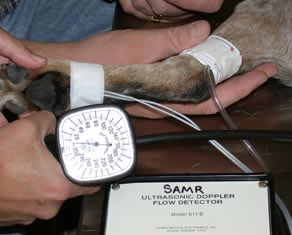 The Small Animal Internal Medicine Service specializes in the diagnosis and treatment of serious or complicated health problems in dogs and cats. Most of our patients have been referred for treatment by another veterinarian. Examples of diseases most appropriately evaluated by an internist include:
The Small Animal Internal Medicine Service specializes in the diagnosis and treatment of serious or complicated health problems in dogs and cats. Most of our patients have been referred for treatment by another veterinarian. Examples of diseases most appropriately evaluated by an internist include:
- Respiratory disease, such as asthma in cats or chronic nasal discharge in dogs
- Gastrointestinal disease, such as pancreatitis or inflammatory bowel disease
- Liver disease, such as hepatic lipidosis or cirrhosis
- Kidney disease, such as urinary stones, chronic urinary infection or renal failure
- Endocrine disease, such as Cushing’s disease or diabetes mellitus
- Hematologic disease, such as hemolytic anemia or thrombocytopenia
- Infectious disease, such as histoplasmosis, ehrlichiosis or feline leukemia virus infection
Veterinarians in practice are able to diagnose and treat many of the conditions and diseases that affect pets. However, internal medicine specialists have completed concentrated training programs in internal medicine and have passed the rigorous examinations of the American College of Veterinary Internal Medicine. This training and experience has focused their knowledge and skills to improve their ability to diagnose and treat your pet’s problem.
The state-of-the-art facilities and specialists at the MU Veterinary Health Center allow us to provide tests and treatment that simply aren’t possible at most other veterinary practices. Internists are trained to perform procedures such as gastroscopy, esophagoscopy, colonoscopy, bronchoscopy, rhinoscopy and cystoscopy.
A better understanding of disease will lead to better diagnostic and treatment options. What we learn in one animal species can often inform our knowledge of other species. The Comparative Internal Medicine Laboratory at the University of Missouri attempts to generate knowledge to improve the health of all animal species, including humans, by answering relevant questions about animal health, searching for answers to those questions in a laboratory setting and then applying those answers back in the clinic.




